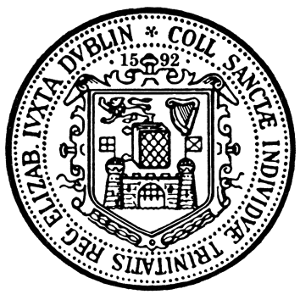Trinity College Dublin
Trinity College Dublin is a university and book publisher. It is located in Dublin, Ireland. It was founded in 1592 and has 16,564 students. It is globally ranked #252. They published 57 books in our database by 44 different authors between 1971 and 2022.
Key facts
Location on a map: 53°33′N, -6°24′W

© Trinity College Dublin - Explore more images
Extract data
Download datasets about Trinity College Dublin:
Dataset of books published by Trinity College Dublin:
Trinity College Dublin is one of the universities in Ireland, universities in Dublin, 2,021 universities and 168,983 book publishers in our database.
Visualize data
Get charts or maps on Trinity College Dublin:
Distribution of books by Trinity College Dublin by publication date
Description
- Trinity College Dublin is Ireland’s premier university, with a proud tradition of excellence stretching back to its foundation in 1592. The oldest university in Ireland, and one of the oldest in Europe, today Trinity sits at the intersection of the past and the future. Our 47-acre campus is located in the heart of Dublin city centre and is home to historic buildings dating from the university’s establishment, as well as some of the most modern and cutting edge teaching and research facilities in Ireland. Students at Trinity benefit from a unique educational experience across a range of disciplines in our three faculties – Arts, Humanities, and Social Sciences; Engineering, Mathematics and Science; and Health Sciences. The pursuit of excellence through research and scholarship is at the heart of a Trinity education, and our researchers have an outstanding publication record and strong record of grant capture. Trinity has developed 19 broad-based multidisciplinary research themes that cut across disciplines and facilitate world-leading research and collaboration within the University and with colleagues around the world. These internationally recognised themes include such diverse areas as Cancer, Immunology, Telecoms, Identities in Transformation, Nanoscience, Neuroscience, and Making Ireland. Researchers from across the University work together in innovative ways to develop new and exciting approaches to their research and explore the frontiers of knowledge in the 21st century. In creating these dedicated research themes, Trinity’s researchers are able to become a more powerful force on the global stage, successfully competing for large-scale grants and attracting top students and faculty to the University. Indeed, Trinity is a member of the prestigious League of European Research Universities (LERU) and hosts a number of ERC fellows. Trinity is home to Ireland’s first purpose-built Nanoscience research institute, CRANN, which opened in January 2008. This state-of-the-art facility houses 150 scientists, technicians, and graduate students in specialised laboratories, fostering creative innovations that have seen Trinity’s researchers make significant breakthroughs. The Trinity Long Room Hub for Arts and Humanities Research Institute is the University’s flagship institute for research in the Arts and Humanities, providing a world-class environment for cross-disciplinary collaborative projects. The Long Room Hub provides a central location through which the University’s internationally respected Arts and Humanities research can become more visible, demonstrating its relevance for contemporary and future societies. Researchers from across the University regularly participate in debates on topical issues facing the world today. As well as operating an International Visiting Research Fellowship programme, the Long Room Hub also hosts major EU-funded Digital Humanities projects. One of the most instantly recognised parts of Trinity’s campus is the famous Old Library, home to the historic Book of Kells as well as other internationally significant holdings in manuscripts, maps, and early printed material. Trinity’s Library is the largest research library in Ireland and is an invaluable resource to Trinity’s students and research community. Built up over the four centuries of the University’s existence, the Library’s collections have benefitted from its status as a Legal Deposit library for the past 200 years, granting Trinity the right to claim a copy of every book published in Ireland and the UK. At present, the Library’s holdings span approximately 4.25 million books, 22,000 printed periodical titles, and access to 60,000 e-journals and 250,000 e-books. Trinity attracts top students from Ireland and abroad and prides itself on the consistently high standard of student admitted to the University every year. These students are drawn to Trinity for the excellence of our research-led teaching and for the quality and prestige a degree from this University confers. Trinity has also pioneered accessibility to education in Ireland, becoming the first university in the country to reserve 15% of its undergraduate places for students from non-traditional learning groups. Our alumni have gone on to shape the history of Ireland and of Europe in a wide range of fields. These include such notable figures as Jonathan Swift, Oscar Wilde, William Rowan Hamilton, Edmund Burke, William Stokes, Denis Burkitt, Louise Richardson, Lenny Abrahamson, and Anne Enright. Three of Trinity’s graduates have been awarded Nobel prizes: Ernest Walton for Physics in 1951; Samuel Beckett for Literature in 1968; and William Campbell for Physiology or Medicine in 2015. Trinity also counts the first female President of Ireland among its alumni in Mary Robinson, as well as other notable former Presidents Douglas Hyde and Mary McAleese. At Trinity we are justifiably proud of our tradition, and we strive to uphold this excellence as we face the demands of the 21st century.
Related
Connected or similar to Trinity College Dublin: .
This dashboard is based on data from: The Center for World University Rankings, Shanghai University Ranking, The British Library.
This content is available under the CC BY 4.0 license.